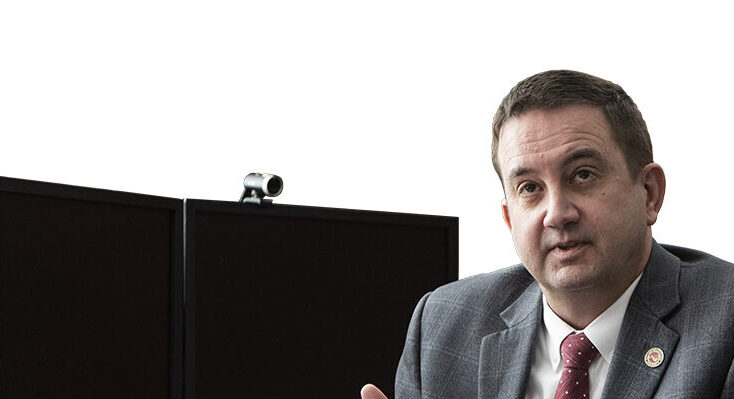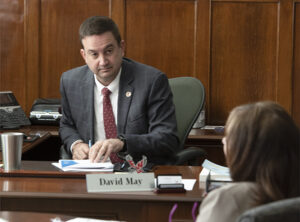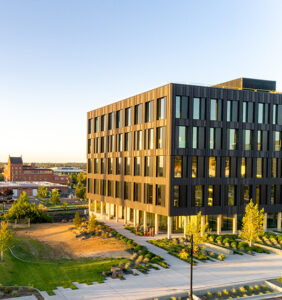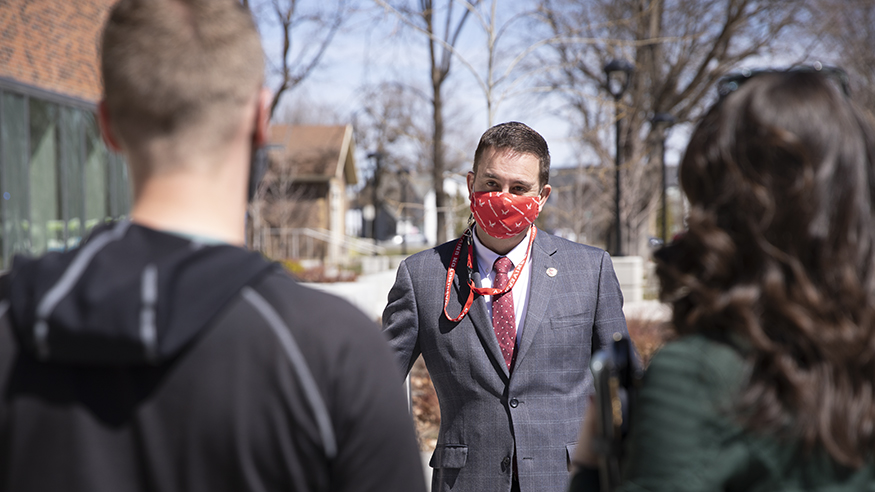Man of the Moment

David May, Eastern’s Interin President, leans into challenging times.
By Dave Meany
It’s March 10, 2021. David May is sitting in the president’s office, his office, on the second floor of Showalter Hall. It’s been exactly 365 days since then-Provost May made what would be one of the most consequential recommendations of his professional life. We must take “immediate action” against this frighteningly contagious new virus, he told fellow administrators: Move finals up, extend spring break and start planning like crazy for an uncertain future.
As he recalls the moment, May holds up that week’s issue of The Easterner, EWU’s student newspaper. Its cover is dominated by a giant rendering of the coronavirus “spike ball.” Inside, the copy reflects the bewilderment and anxiety of a student body that had yet to fully absorb the extent of the crisis.
Across the nation, higher education leaders were themselves struggling. Just how serious is this thing? Can we conduct classes safely? If not, then what? For David May, the choice was clear: Student safety first. We act now, and then figure out the rest. His boss, President Mary Cullinan, agreed.
“Boy, did we get beat up,” May says. “But it was the right thing to do.”
May’s decision last spring was just the first of many improbable challenges he — and faculty and administrators across the university — would be forced to confront over a year like no other. Among the more difficult of these hurdles involved implementing an early, and at the time controversial, decision to move nearly all instruction, and most other operations, to the virtual realm.

There were also tough calls involving twists and turns in campus governance, as circumstances unrelated to the pandemic led to Cullinan’s departure from the university’s leadership team. In this, too, May was ready to step up. On August 4 he was selected by Eastern’s Board of Trustees to serve as EWU’s interim president for a period of no less than two years.
“David May’s vision and leadership during this historical stretch gives the board the utmost confidence he will keep the university on the path to success,” Vicki Wilson, the board’s chair, said at the time.
For his part, May says he was “eager and excited” to lead, though he admits now it was all something of a whirlwind. Especially for someone who, until recently, had never really imagined himself as an administrator, much less a university president.
For an ‘Introverted’ Scholar, a Rapid Rise
“I was really happy in faculty,” May says. As a political scientist who relishes teaching subjects such as philosophy of law and the finer points of Constitutional interpretation, May had been perfectly contented as a professor for most of his 20-year career at Eastern. A self-described introvert — “I’m very introverted on any scale that exists in the world” — he taught his classes, mentored his students and counted himself fortunate to see how he was making a difference in their lives.
“The privilege of being in the classroom is that you see that transformation. It’s so much fun when you’re in that moment and the students are fully engaged. It’s just magical to watch.”
But as we’ve all learned over the last year, even the most stable-seeming situations can change quickly. For May, change meant recognizing that what was best for Eastern and its students was his acceptance of a series of administrative posts, each with more responsibility, as Eastern reeled from turnover in top positions. In a whirlwind 11-month stretch starting in March 2020, May served as vice provost for academic affairs, interim provost and then provost — this before being named interim president. When the Board of Trustees asked if he would step up to the president’s position, May says he was honored but somewhat ambivalent.
“I had never seen myself as a provost: not that I didn’t think myself capable of doing it, but it wasn’t my career objective,” May says. “So when Dr. Cullinan resigned and the board asked me to serve as the interim president, there were a lot of conversations with my wife and family. It was obviously going to be a big change, not just for me but for my wife especially, her being part of the public life of the university.”
May and his wife, Monica, a primary care physician, have been married for 26 years. Their daughter, Emily, is an undergraduate at Western Washington University in Bellingham. (“Currently going to Western in my dining room,” May joked to the InsideEWU digital newsletter earlier this year.)
“It is something that I feel very proud and privileged to be able to do, but I’m doing it because — as I have for the past 22 years — I want to be of service to the university and, more particularly, to its students,” May says.
After a lot of soul searching and discussion, May says, he and his family got to “yes.”
“It wasn’t something that I was aiming for in my life,” May says of becoming Eastern’s interim president. “It is something that I feel very proud and privileged to be able to do, but I’m doing it because — as I have for the past 22 years — I want to be of service to the university and, more particularly, to its students.”
Once situated in his new Showalter digs, Eastern’s new leader quickly came to realize the full scale and scope of what he had taken on: enough challenges and potential land mines to make even the most seasoned administrator want to head for the hills.
Funny thing, heading to the hills is exactly what May loves to do. He enjoys year-around outdoor activities like biking, hiking or backcountry skiing. It’s where an introvert can really find his groove. But like many of us, finding the groove didn’t come easy.
A Winding Road to Academe
“Very late” is how May describes his non-traditional route to college. The son of a college professor, he didn’t follow his father’s footsteps so much as chart a meandering path back to the paternal trade.
“I grew up farming and ranching and sort of transitioned into construction work. I went to Whitman College because it was in Walla Walla, and my dad was teaching there. But I was not prepared to do it,” he says.
May recalls going to class exhausted — or just skipping it altogether — after a day of pouring concrete. He once woke up to his father sitting at the edge of his fraternity house bed, staring him down, after another professor had told him that his son had not been in class for a week.
“I think that made it clear that I couldn’t keep doing things exactly the way I had done them,” May says with a smile.
Doing things differently meant transferring to WSU in Pullman, but he spent more time in Walla Walla courting his future wife, Monica. So it was back to Whitman to get that bachelor’s degree in political science. Marriage followed. So did master’s and doctoral degrees at WSU. After landing a faculty-in-residence position in Eastern’s Department of Government and International Affairs, May’s young family welcomed daughter Emily, and he settled in for a nice, steady career at EWU.
Ironically, this proud professor almost didn’t make the move into administration. When he first had an inkling he’d be offered a position, his first thought was “no way, it’s not worth it.” But after a conversation with then-Provost Scott Gordon, and some reflection, May decided to give it a go. And his commitment to Eastern made it even easier to say yes when asked to take over the presidency on an interim role.
“People wonder why I did it,” says May. He knew the university couldn’t really pull off a search in the middle of a pandemic, so he thought it would be in the best interest of campus to hold down the fort. “People know me, and there’s at least that level of trust. I hope that people can believe the decisions I’m making are not in my best interest, they’re in the best interest of Eastern.”
Those who worked alongside him agree.
“I would argue that no one knows Eastern as well as he does and his loyalty is, and always has been, to constantly improving the university,” says longtime colleague, Kevin Pirch, a professor of political science. “Perhaps more important than [his] experience, Dave has the character, intellect, patience, and creativity to lead at every level,” adds Jim Headley, professor and political science department chair. “His considered even-keel approach to everything is particularly helpful in these trying times.”
Oh yes, about those trying times.
Calm in a Crisis
Even before the virus shifted everything into crisis mode, higher education nationwide was already facing many challenges, and May began his tenure in the middle of the storm. Declining enrollments; looming state budget cuts; the loss of campus revenue-generating services; a sudden administrative overhaul; layoffs and furloughs; a deep-dive review of academic programs that would lead to resized and reduced offerings; and a contentious review of athletics. And all of this magnified by the devastating economic and mental health issues created by the pandemic, a crisis that pushed much of the campus community into a mostly uncharted virtual world of teaching, learning, meetings and events.
So what does an interim president do in the middle of six major crises, any one of which might exasperate even the most experienced administrator? Fortunately, those days of farm work and pouring concrete left May with some pertinent life lessons.
“I go back to where I started with farming and ranching, construction work. You get up in the morning, you put on your pants and you do what you can,” May says. “Maybe you start cutting that huge field of wheat with your combine, and you think it’ll never get done. And then you remember two things: It doesn’t have to get done today, and there are three other combines helping you.”

But May isn’t dwelling on all the storms swirling around him. Instead, he knows the university must remain focused on the best way to serve students in the future – a road Eastern was already traveling down before Covid-19. That future includes ‘right-sizing’ the university and the Academic Program Review is an essential component. The review, which includes stakeholders from across campus, is designed to evaluate all academic offerings to ensure that they align with student demand and the regional need for graduates, while also addressing budget shortfalls.
The bottom line, May points out, is that Eastern can’t simply resort to business as usual. “We will continue to teach art, we will continue to teach music, we will continue to teach philosophy, we will continue to teach political science, but we have to rethink how those things fit into the overall education of the student.”
May says this rethinking, while challenging, also presents an opportunity to evolve. For instance, the Catalyst in downtown Spokane — a state-of-the-art, smart, zero energy building — is now the centerpiece of some of EWU’s high-demand offerings such as computer science, design and electrical engineering. “Because in that reshaping, resizing, refocusing, we can move toward things like the programs in Catalyst. Catalyst is what the new university looks like,” May says.
The new university also looks like the Interdisciplinary Science Center (ISC), another key addition to the rejuvenated Cheney campus. Both point to brighter days ahead, he adds.
But the university is not out of the woods yet. May believes the remaining barriers to better times, chief among them issues involving enrollment, can only be overcome with redoubled efforts toward greater inclusivity.
Such efforts, he argues, must center on resolving “access issues” that stand in the way of educational opportunities for our state’s and region’s lower-income families — particularly lower-income families of color. This is why, among other initiatives, Eastern is working toward earning a Hispanic Serving Institution designation – a step that will not only help attract and retain Latino students, but also provide federal resources to help students from all walks of life.
An Extended To-Do List
But there’s work to do. Despite a slight recent increase in the number of Washington’s high school graduates, the state’s number of potential enrollees out of high school will start to head downward. This means more competition for fewer students, a recruiting challenge that doesn’t appear to be easing.
At Eastern, enrollment and retention issues have been especially concerning in recent years, a trend exacerbated by the pandemic. This year’s calculation of what administrators call the “average annualized headcount” — a measure of turnover in enrollment — has shown a roughly 14 percent decline.
Lower enrollment stresses the budget in a normal year. But in 2020, of course, the early impacts of the pandemic rocked state revenues, resulting in an appropriations hit for all of higher education in Washington, including Eastern. State-projected reductions of 15 percent meant Eastern had to cut $10 million from its bottom line over the summer — part of a projected $22 million in pandemic-related losses that the university was forced to absorb during the previous and current fiscal years.

“A reduction in the budget of a place like Eastern — because of our student demographic; because of who we serve — disproportionately impacts minority students, low-income students, first-generation students, exactly the people that, at this moment in time, we need to be lifting up,” May says.
Fiscal hurdles are not limited to enrollment concerns. Perhaps the most highly fraught issue on May’s plate involves an often-passionate debate concerning the future of Eastern athletics.
As Eastern’s athletic programs have struggled with their own budget deficits, some faculty members have wondered aloud whether Eastern’s NCAA Division I status is sustainable in its current form. Others have questioned whether intercollegiate sports should be dropped entirely.
In late February, a consultant’s report commissioned by the university outlined multiple options for May to consider before offering a recommendation to the Board of Trustees. A period of public comment followed, and May has since been actively seeking input from a broad range of concerned individuals and groups.
As of press time, he had yet to make public where he stands. He acknowledged, however, that nothing he can recommend is likely to please everyone.
“Absolutely, we will come to a decision about athletics,” May says. “And it will be a decision that not everyone will be happy with, because there is no answer that will make everyone happy.”
The New, and Better, Normal
Acknowledging that this and other decisions will almost certainly disappoint, even anger, many of those whom he would very much like to win over, is, his colleagues say, key to May’s appeal. Even in disagreement, he wants to engage, to convince, to take seriously the alternative point of view.
This is evident even on Zoom. May is frank but never condescending, authoritative but not intimidating. He often leans slightly into an exchange, a posture that conveys an earnestness rare among wizened administrators.
It’s a demeanor that seems right for this moment, these challenges. His old political-science peers agree. “I really couldn’t imagine a better person to lead Eastern through this environment, he’s thoughtful, creative and respected,” says Pirch. “He has a great leadership quality of listening to a variety of different perspectives and then making a decision, but once he makes that decision, everyone knows why he did it and what his justifications were.”
Just as important, adds Headley, will be May’s sturdy hand at the helm. “We haven’t seen storms like this before, and Dave’s steady demeanor is helping us navigate the storms and get us through to a better place.”
May says he can’t wait for Eastern to be in a better place. He wants to walk the grounds and visit with students, say “Hi” again to staff and faculty, and make the rounds with enthusiastic alumni. Most of all he wants to feel that electric, youthful vibe that grips the Cheney campus each fall and spring.
If he is to be Eastern’s long-term leader, in other words, May believes he must earn it. He thus welcomes a national search for a new president.
So does this mean he also wants that interim tag removed?
“I do not,” May says emphatically. “I do not want to assume the presidency by default.”
If he is to be Eastern’s long-term leader, in other words, May believes he must earn it. He thus welcomes a national search for a new president. “I believe I have a vision for Eastern; I believe it’s a vision that is shared by a large number of people on this campus, but I don’t know if I’m the best person, and I think that the only way to know that is to go through this process.”
In late April, just as Eastern magazine was going to press, the EWU Board of Trustees voted to begin that process, announcing the formation of a Presidential Search Advisory Committee to head the hunt. As part of this effort, the board also announced it would hire a consultant to conduct a nationwide search for qualified candidates.
“One of the most important responsibilities of the Board of Trustees is to select the university’s president,” says chair Vicki Wilson. “We encourage the campus community to fully engage in this process.”
May says he has not yet decided whether he will declare himself a candidate for the permanent position. When pressed on the question, he adopts a mock-stern scowl, stares into the Zoom camera and says nothing.
Eventually, he laughs and says, “I’ve learned how to not react by years of serving in the Faculty Senate. But the honest answer to your question is that it’s a conversation that my wife and I are having, along with our daughter.”
In the meantime, May adds, his singular focus remains on the task at hand — or, rather, the tangle of tasks at hand. And there is good news on that front. Like the wider world, the university is finally inching closer to a return to pre-pandemic normalcy. More campus buildings will reopen in July, and plans are taking shape for a return to in-person instruction this fall. New federal relief appropriations — albeit in the form of one-time funding — are meanwhile helping EWU to extend its support for students facing their own financial challenges, while improving state revenues are providing hope that Olympia will do its part to sustain and expand our state’s investment in public universities like Eastern.
In short, better times appear to be on the horizon.
“We’ll get there, but the better we can do today, the sooner we’ll get there,” May says. “We also have to continue to give each other as much grace as possible. We’re all in a pressure cooker together.”
Tagged With: Spring/Summer 2021


